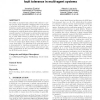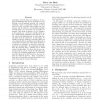60 search results - page 11 / 12 » Practical First-Order Temporal Reasoning |
VMCAI
2009
Springer
14 years 1 days ago
2009
Springer
—A variety of partial modeling formalisms, aimed re and reason about abstractions, have been proposed. Some, e.g., Kripke Modal Transition Systems (KMTSs) put strong restrictions...
ATAL
2009
Springer
13 years 12 months ago
2009
Springer
The ability to guarantee that a system will continue to operate correctly under degraded conditions is key to the success of adopting multi-agent systems (MAS) as a paradigm for d...
CAV
2004
Springer
13 years 9 months ago
2004
Springer
Model checking algorithms can report a property as being true for reasons that may be considered vacuous. Current algorithms for detecting vacuity require either checking a quadrat...
DAGM
2006
Springer
13 years 9 months ago
2006
Springer
This paper presents a practical system for vision-based traffic scene analysis from a moving vehicle based on a cognitive feedback loop which integrates real-time geometry estimati...
AAAI
1992
13 years 6 months ago
1992
Constraint networks have been shown to be useful in formulating such diverse problems as scene labeling, natural language parsing, and temporal reasoning. Given a constraint netwo...


